江苏省徐州市睢宁县宁海外国语学校七年级英语上册《Unit 4 My day》综合测试卷(无答案)(新版)牛津版
- 格式:doc
- 大小:89.01 KB
- 文档页数:4
![[2021精选]七年级英语上册 Unit 4《My day》(welcome)](https://uimg.taocdn.com/763fb48558fafab068dc0209.webp)
My day学生姓名__________________ 家长签名___________________学习目标:1.介绍日常学习和生活的根本安排和活动。
2.对自己或他人的一天进行简单的描述。
【课前热身】:1一大声朗读下面的词组,并在书上划下来★根本词汇1.表示提出或征求意见___________2.活动n____________(复数)________________3.家庭作业 n___________________(___________名词)1.醒醒2.开始上课 ________3.到时间做某事 __________ 6.去睡觉 7.玩得快乐 __ 8. 做课外活动 _____ ___ 9.上课 ____________ 10.看报纸 ____ __11.做早操/眼保操 __________ __12.需要某事 ___ _ 14.看太多的电视__________________15….迟到____ 17.上学/工作迟到(2) ______=_________________1.是吃早饭的时候了嘛?_____________________________________________________________2.我们去山上散步好吗?____________________________________________________________3.一些狗就是不知道怎样玩乐。
______________________________________________________4.我上学从不迟到。
________________________________________________________________5.米莉,你喜欢上学吗?________________________________________________________,Millie?6.——你们什么时候开始上课?——8:15.——_____________________________________________——____________________________7.午饭后,我总是需要好好休息。
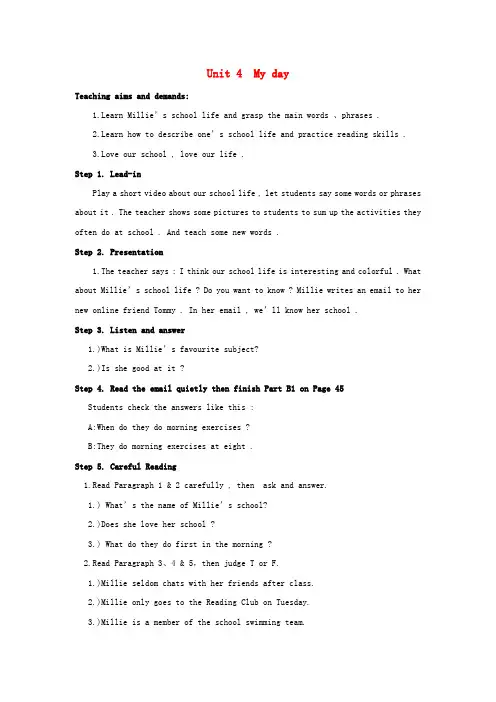
Unit 4 My dayTeaching aims and demands:1.Learn Millie’s school life and grasp the main words 、phrases .2.Learn how to describe one’s school life and practice reading skills .3.Love our school , love our life .Step 1. Lead-inPlay a short video about our school life , let students say some words or phrases about it . The teacher shows some pictures to students to sum up the activities they often do at school . And teach some new words .Step 2. Presentation1.The teacher says : I think our school life is interesting and colorful . What about Millie’s school life ? Do you want to know ? Millie writes an email to her new online friend Tommy . In her email , we’ll know her school .Step 3. Listen and answer1.)What is Millie’s favourite subject?2.)Is she good at it ?Step 4. Read the email quietly then finish Part B1 on Page 45Students check the answers like this :A:When do they do morning exercises ?B:They do morning exercises at eight .Step 5. Careful Reading1.Read Paragraph 1 & 2 carefully , then ask and answer.1.) What’s the name of Millie’s school?2.)Does she love her school ?3.) What do they do first in the morning ?2.Read Paragraph 3、4 & 5,then judge T or F.1.)Millie seldom chats with her friends after class.2.)Millie only goes to the Reading Club on Tuesday.3.)Millie is a member of the school swimming team.Step 6. Play a gameStep 7. PracticeComplete Millie's school life .(方框选词填空)in the afternoon, have a good time, chat with,play in the playground, practise, nice ,start,Millie is a new student at Sunshine Middle School . Her school ________at 8:00in the morning . Millie has a lot of friends at School . They are all ______ toher . After class , they often _____________ each other or _____________________. Sometime she goes to the library________________. She often reads books in the Reading Club . She also likes playingvolleyball. She is a member of the school volleyball team.She ___________ afterschool on Wednesday afternoon . She always_______________ at her school.Step 8. ConsolidationGroup work: Can you talk about your school life .Student1 : School and lessonsStudent2 : Friends at schoolStudent3 : HobbiesStudent4 : After-school activitiesStudent5 : FeelingStep 9. Watch and discuss1.)What's the differences between our school and theirs ?2.)What do you think of their school life ?3.)What should we do ?Step 10. Homework1.Read and recite Millie’s email.2. Write something about your school life in English and then talk about it withyour classmates.【课后拓展】阅读理解:Hi. I’m LingLing. I’m a studen t at No. 14 Secondary School. Do you want to knowmy life? Let me tell you about it. I usually get up at 7:00 in the morning. I have my breakfast at 7:10. My parents always prepare(准备)the breakfast for me. I go to school at 7:30. We have 7 lessons every day f rom Monday to Friday. I like English lesson very much. After school, I like playing ping-pong and basketball with my friends. There is a very big playground in our school.( )1. I have my br eakfast at ______.A. 7:00B. 7:10C. 7:30D.7:20( )2. I have seven lessons ____.A. every dayB. at the weekendC. five days a weekD. twice a week( )3. I like ______ very much.A. EnglishB. ChineseC. art lessonD. all lessons( )4. There is a big ______ in No. 14 Secondary School.A. gardenB. libraryC. playgroundD. computer room( )5. I li ke playing ______ with my friends.A. ping-pong and basketballB. footballC. football and basketballD. basketball。
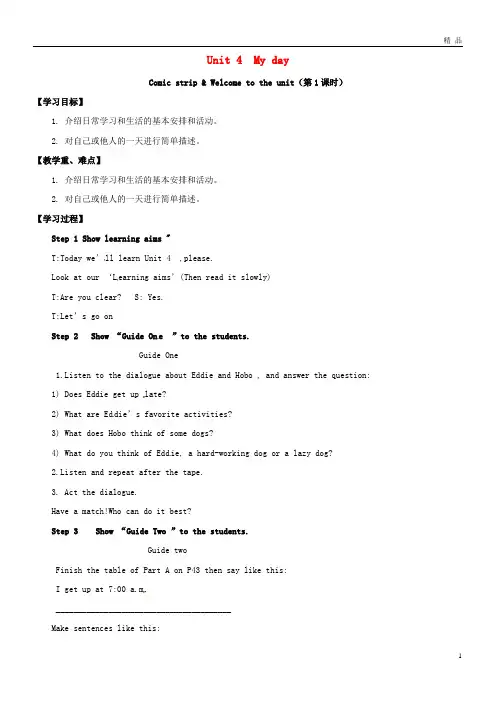
Unit 4 My dayComic strip & Welcome to the unit(第1课时)【学习目标】1. 介绍日常学习和生活的基本安排和活动。
2. 对自己或他人的一天进行简单描述。
【教学重、难点】1. 介绍日常学习和生活的基本安排和活动。
2. 对自己或他人的一天进行简单描述。
【学习过程】Step 1 Show learning aims "T:Today we’ll learn Unit 4 ,please.Look at our ‘L earning aims’(Then read it slowly)T:Are you clear? S: Yes.T:Let’s go onStep 2 Show “Guide On e ”to the students.Guide One1.Listen to the dialogue about Eddie and Hobo , and answer the question:1) Does Eddie get up late?2) What are Ed die’s favorite activities?3) What does Hobo think of some dogs?4) What do you think of Edd ie, a hard-working dog or a lazy dog?2.Listen and repeat after the tape.3. Act the dialogue.Have a match!Who can do it best?Step 3 Show “Guide Two ”to the students.Guide twoFinish the table of Part A on P43 then say like this:I get up at 7:00 a.m.________________________________________Make sentences like this:Millie gets up at 6:30 in the morning._______________________________________Have a match ! who can do it bestStep 4 Show “Guide Three”to the students.Guide ThreeListen to the tape and answer the questions about Millie.1)When doe s Millie go to school every day?2)Is Millie late for school?Have a match ! who can do it best!Class Exercise (一)重点短语默写。
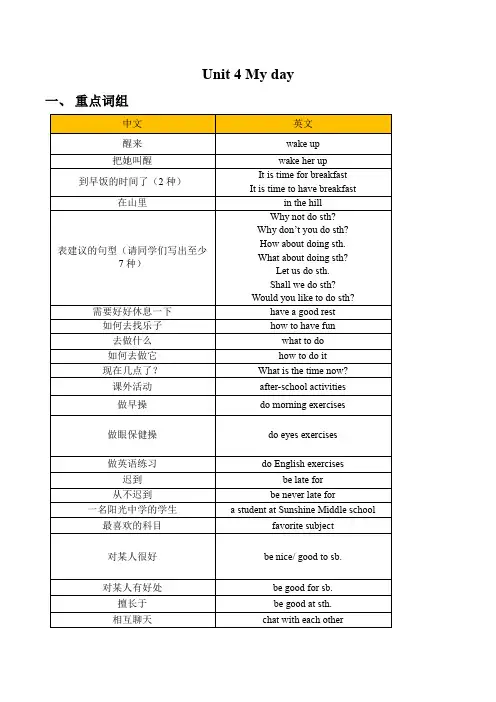
Unit 4 My day 一、重点词组二、重点语言点1. wake upwake 常作及物动词,意为“使醒来,唤醒” Please wake me up at seven o’clock.wake作不及物动词,意为“醒,醒来” He woke three times during the night.当wake up意为“叫醒”时,要注意宾语的位置。
如果宾语是人称代词,通常位于wake和up之间。
如果宾语是名词,则既可以位于wake和up之间,也可以位于wake up之后。
wake up your dad=wake your dad up wake me up2. It’s time for ...It’s time for sth = It’s time to do sth 该是做某事的时候了It’s time for lunch. = It’s time to have lunch. 该是吃午饭的时候了。
It’s time for sb to do sth 该是某人做某事的时候了。
It’s time for the children to go to bed. 该是孩子们上床睡觉的时候了。
3. Shall we go walking in the hills?【精讲】Shall we...?意为“我们……好吗?”,shall用于第一人称,表示提出或者征求建议,常用Good idea.或者Sounds great.来回答。
4. go outgo out 外出;出去;熄灭;过时Let's go out on Saturday night. 我们星期六晚上出去吧。
Let's go out for some fresh air. 咱们出去呼吸点新鲜空气。
The bedroom light went out after a moment. 卧室的灯片刻后熄灭了。
The fire seemed to be going out. 火看来快熄灭了。
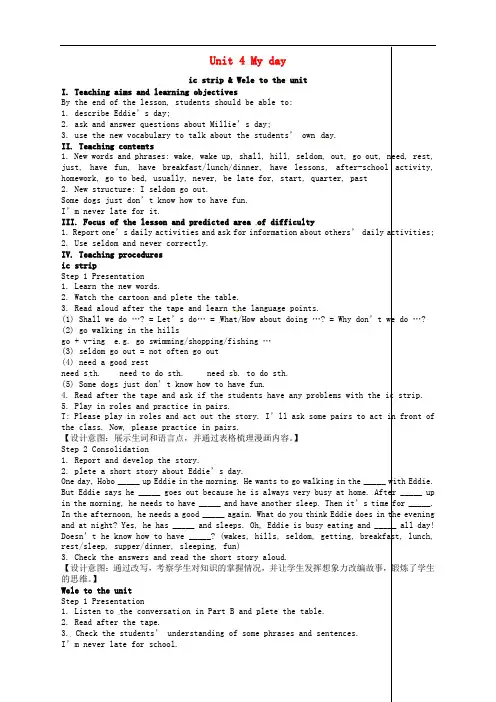
tudents’ own day.1. New words and phrases: wake, wake up, shall, hill, seldom, out, go out, need, rest, III. Focus of the lesson and predicted area3. Read aloud after the tape and learn t he language points.What/How about doing …? = Why don’t we do …? need se1. Listen to the conversati on in Part B and plete the table.start lessonsat a quarter past eightenjoy schoolT: OK, do you have any questions to ask me? “I’m never late for it.” Who can translate it into Chinese? What does “never” mean?4. Develop the conversation.【设计意图:通过书上提供的表格进行扩展练习。
】Step 2 Consolidation1. plete the passage, check the answers and read the passage aloud.T: OK, you really did a good job. Now are you clear abou t Millie’s daily activities? Please plete this short passage about Millie’s day.Millie is a hard-working student. She ______ up early in the morning. She goes to _______ at 7:20. She’s _______ late for school. Before the first lesson starts, Millie and all her classmates do morning ________. She has lunch at ten to ________. The school finishes at four ______ in the afternoon. Then it’s time for after-school ________. She always has fun. In the evening, Millie watches TV for ______ an hour. It’s her favourite time of the day. Then she needs to do her __________. She always does it carefully. She usually goes to _______ at 9:30.2. Report your day.(1) plete the table in the book abo ut the students’ own days.T: Now, I know something about Eddie’s and Millie’s days now. Next, I’d like to know about your day. Please write down the time and the activities in the table.(2) Practice reporting the students’ own da ys.T: OK, p lease try to report your day according to the table you finished just now. I’ll give you only two minutes to practice. Please try to make your report clear and interesting.(3) Ask a student to report and the other students to listen carefully.T: Time is up! Are you ready to report your day? When one student is telling about his or her day, the others should listen carefully. I will ask you questions after the report. Who’d like to be the first to tell us about your day?T: Thank … for your report. Now q uestions for the other students. Are you ready? Question 1 …【设计意图:让学生结合自己的实际情况练习,达到学以致用。
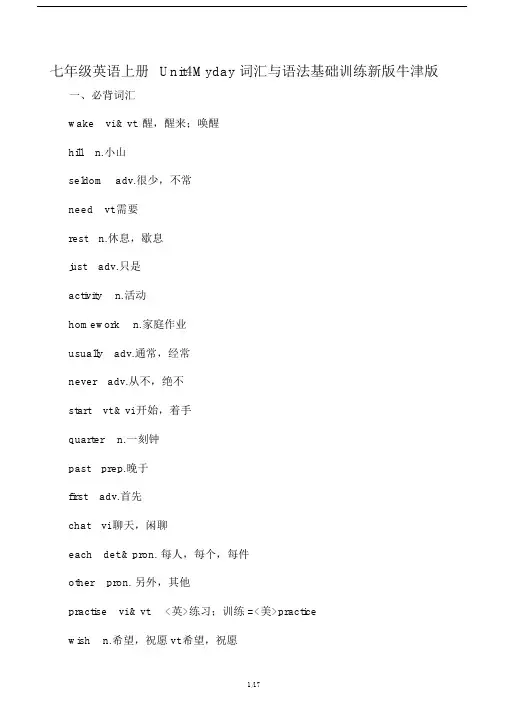
七年级英语上册Unit4Myday 词汇与语法基础训练新版牛津版一、必背词汇wake vi.& vt. 醒,醒来;唤醒hill n.小山seldom adv.很少,不常need vt.需要rest n.休息,歇息just adv.只是activity n.活动homework n.家庭作业usually adv.通常,经常never adv.从不,绝不start vt.& vi.开始,着手quarter n.一刻钟past prep.晚于first adv.首先chat vi.聊天,闲聊each det.& pron. 每人,每个,每件other pron. 另外,其他practise vi.& vt. <英>练习;训练 =<美>practicewish n.希望,祝愿 vt.希望,祝愿life n.(pl. lives)生活;生命luck n.好运,荣幸museum n.博物馆twice adv.两次picnic n.野餐once adv.一次dislike n.不喜爱,厌恶reason n.原因,理由ready adj.准备好,准备完毕learn vt.& vi. 学,学习,学会world n.世界二、重点词汇1.seldom adverb /?seld?m/almost never很少;几乎从来没有例句:Now that we have a baby, we seldom get the chance to go tothe cinema.有了孩子以后,我们很少有机会看电影了。
We seldom receive any apology when mistakes are made出.错的时候,我们很少听到道歉的话语。
2. activity noun /?k?t?v?ti/the situation in which a lot of things are happening orpeople are moving around活跃;繁冗;热烈例句:Therewasalotofactivityinpreparationforthe Queen“ svisit.大家都在为准备迎接女王来访而冗忙。
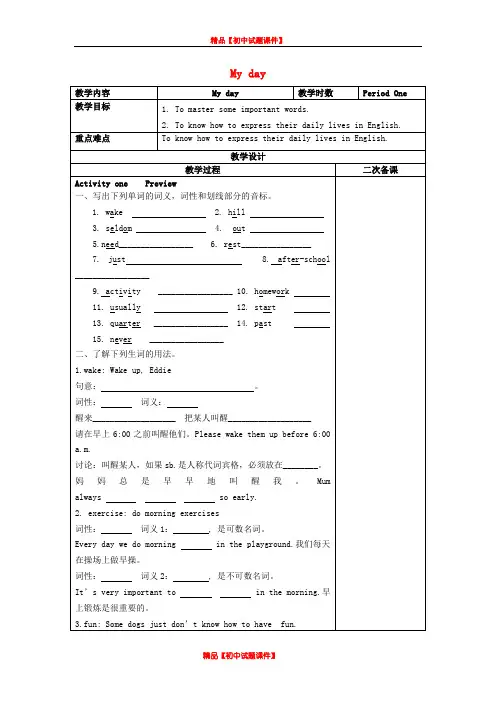
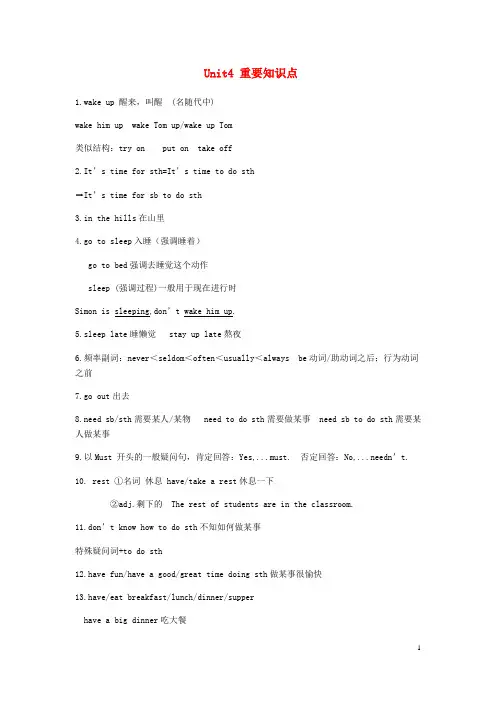
Unit4 重要知识点1.wake up 醒来,叫醒 (名随代中)wake him up wake Tom up/wake up Tom类似结构:try on put on take off2.It’s time for sth=It’s time to do sth➡It’s time for sb to do sth3.in the hills在山里4.go to sleep入睡(强调睡着)go to bed强调去睡觉这个动作sleep (强调过程)一般用于现在进行时Simon is sleeping,don’t wake him up.5.sleep late睡懒觉 stay up late熬夜6.频率副词:never<seldom<often<usually<always be动词/助动词之后;行为动词之前7.go out出去8.need sb/sth需要某人/某物 need to do sth需要做某事 need sb to do sth需要某人做某事9.以Must 开头的一般疑问句,肯定回答:Yes,...must. 否定回答:No,...needn’t.10. rest ①名词休息 have/take a rest休息一下②adj.剩下的 The rest of students are in the classroom.11.don’t know how to do sth不知如何做某事特殊疑问词+to do sth12.have fun/have a good/great time doing sth做某事很愉快13.have/eat breakfast/lunch/dinner/supperhave a big dinner吃大餐14.do morning exercises 做早操 do eyes exercises做眼保健操do exercise锻炼15.do after-school activities 做课外活动16.时间表达法:分钟数≤30:分钟数+past+钟点数分钟数>30:60-分钟数+to+下一个钟点数8:15 a quarter past eight/fifteen past eight/eight fifteen8:45 a quarter to nine/fifteen to nine/eight forty-five17.write to sb写信给某人18.a day at school在学校的一天19.at eight in the morning在早上8点钟20.from Monday to Friday从周一到周五21.on+星期几/星期几的某个时刻On Monday On Friday afternoonon every Monday=on Mondays在每周一22.first ①adv. 作状语②adj. 第一的 the first第一 at first首先 for the first time第一次sb's first time某人的第一次 first of all首先23.be nice / friendly to sb对某人好/友好24.chat with each other互相聊天25.in the playground在操场上(有围栏)26.practise ①vt.练习 practise doing sth练习做某事②➡n. practice27.best wishes(to sb)wish sb sth. ➡wish sb good luck27.life ①不可数名词“生活”②可数名词“生命”复数:lives28.have (a great)fun29.luck(不可数名词)➡lucky(adj.幸运的)➡luckily(adv.幸运地)反:unlucky 反:unluckilygood luck好运 bad luck 倒霉good luck with sth 祝某事顺利 good luck to sb祝某人好运30.对频率提问:how often对时长提问:how long过...多久;how soon31.twice a month一月两次32.go for/on a picnic去野餐have a picnic野餐33.【交叉翻译】a car in the park停在公园里的一辆车 a nurse at work 在工作的护士34.dislike ①n. What’s your dislike?②vt. dislike doing sth讨厌做某事 dislike sb doing sth讨厌某人做某事35.be good for...对..有好处 be bad for...对..有坏处be good to sb对某人好=be nice to sb36.be/get ready for sth为某事做好准备get sth ready for sb.为某人准备好某物get ready to do sth准备好做某事be ready to do sth ①准备好做某事②乐意做某事37.learn a lot about the world学到许多有关世界(的知识)learn to do sth学习做某事learn from sb向某人学习learn from each other互相学习38.in the world(在)世界上a map of the world世界地图all over the world=around the world全世界39.39.on Children’s Day在儿童节40.at Christmas在圣诞节41.时间介词in,on,at的用法42.频率副词:never<seldom<sometimes<often<usually<always用法:be动词,情态动词,助动词之后;行为动词之前提问:How often43.go home➡go to one’s home walk home➡walk to one’s home 地点副词(home,here,there)前不能直接加介词44.take time to exercise花时间锻炼45.open/close 开/关(门,窗,盒子等)turn on/off 开/关(电器类名词)be tired疲倦,累 feel tired感到累。
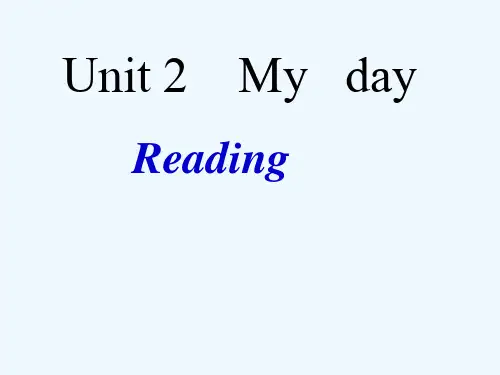
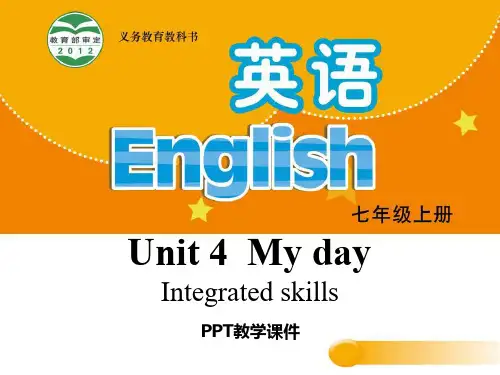

Unit 4 My dayIntegrated skillsI. Teaching aims and learning objectivesBy the end of the lesson, students should be able to:1. get useful information about a volleyball match from the listening material;2. complete a notice about the match with the use ful information they’ve got;3. talk about their weekend activities.II. Teaching contents1. New words and expressions: once a week, twice a month, visit the museum, go on picnics2. New structures: That’s great!Wish our team good luck!III. Focus of the lesson and predicted area of difficulty1. Grasp the usage of the useful expressions and sentence structures (especially once/twice/wish);2. Get useful information from the listening material;3. Use proper expressions and sentence structures to describe their weekend activities (especially adverbials of frequency).IV. Teaching proceduresA. A volleyball matchStep 1 Presentation1. Useful expressions and sentence structures.(1) Focus on two of the pictures above and teach the new expressions and sentence structures.T: Well done! Now look at this picture. Try to answer these questions.a. When does Millie’s mother go to Sunshine Middle School? (In September and March.)b. Why does she go there? (To take part in the parents’ meeting.)c. How many times do they have a parents’ meeting every year? (Twice)d. How many times do they have a parents’ meeting every term? (Once)e. How often do they have a parents’ meeting? (Twice a year./Once a term.)f. How often does Millie practice playing volleyball? (Once a week.)g. What does Millie dream about? (She wants to win the cup in a volleyball match.)h. Will her dream come true? Let’s wish her good luck.(2) Exercise.T: How do you say “桑迪两次赢了比赛,真是太幸运了!” in English?Sandy won the match .What it is!What girl she is!How she is!(Students are expected to grasp the new words, “once”, “twice”, “wish” and “luck”.)2. Listen to the conversation and do some exercises.(1) Finish Part A1 on Page 49.(2) Finish Part A2 on Page 49.(3) Finish Part A4 on Page 50.(4) Read the notice on Page 50 in chorus.【设计意图:先提出问题再播放音频,让学生带着问题在听的过程中去寻找答案,提高听的有效性。
七年级英语上册Unit4Myday教案Unit 4 My day Teaching aims1.Learn to talk about daily activities in English2.Learn the new wordsStep 1. Lead-in1.What time do you usually get up?2.When do you go to school every day? Step 2. PresentationLearn some new wordswake up 醒来seldom adv. 很少need vt&n需要have fun 玩得高兴activity 活动homewok 家庭作业usually adv. 通常start vt&vi开始quarter n.四分之一past perp.经过never adv.从不be late for 迟到Step 3 Look and answerWhat is Eddie doing?Ste p 4 Listen and anwer1 .What is Hobo doing?2. What does Eddie do after breakfast?3. What does he do after lunch?4. What does he do after lunch?Step 5 Read and actFree Talk:Do you want to be a lazy student?Step 6 Ask and answer1.What do we often do at school?2.What do we do at home?do morning exercise s have lessonsdo after-school activities get upeat breakfast/lunch/supper go to beddo homework watch TVStep 7 Look at Millie’s dailyStep 8 Let’s have a talk-- What time does Millie get up?-- She _____________________-- What does she do at 7.30 a.m.?-- She _____________________Step 9.Talk about your daily activities:1.Finish the form on page 43.2.Try to say something about your own daily activities like that:Hi, I’m _______. I’m _____ years old.I study at _______________.I __________. In the morning, I ____________________Step 10.Listen and answer1.When does Millie go to school every day?2..What time does Millie start lessons every day?Step 11.Read and actStep /doc/7510957433.html,nguage pointsStep 13.Exercises:1.翻译下列词组2.用所给词的适当形式填空3.选词填空4.完成下列句子Homework1. Act the conversation in pairs after class.2. Preview the new words in Reading.ReadingTeaching aims:1. Identify specific information about school life and activities2. Practise reading skills by learning Millie’s article.3.Learn the new wordsStep 1 Lead-inA story about FrankStep 2. Discussion1.Do you like your school?2.What do you think of your school life?3.What do you often do at school?Step 3.Talk about your school life1. What do you think of your school?2. When does your school day start?3. Do you do morning exercises at school? When?4. When do you begin your lessons?5. What are your favourite lessons?6. What is your favourite sport?Step 4.Read and learn some new wordsin the morning/afternoon/evening 在上午/下午/晚上favourite adj.最喜爱的from…to… 从…到…first adv. 首先chat vi.聊天practise vt/vi练习have a good time 玩得高兴best a dj./ad v. 最好的wish n.祝愿Step 5.Read and answerW h ich is Millie’s favourite subject?Step 6 Finish B1 and B2 then check answersStep 7 Read after the tape then finish more exercisesStep 8 Finish B3 and C then check answe rsStep 9 Phrases and language points in the articleStep 10TaskRetell Millie’s sch ool lifeStep 11 Interview then give a short speechbe a student at, start , from…to…, do morning exercises, lessons begin, favourite subject, be good atfriends, be nice to, chat withlibrary, a Reading Club, read books, like playing volleyball , be in,have a good timeStep 12 HomeworkWrite about your school lifeGrammarTeaching Aims:.Learn the use of prepositions of time and adverbs of freque ncyStep1 Lead-inIt is very cold in winterChildren’s Day i s on June 1st.They do morning exercises at 8 o’clockStep2 Present the use of preposition of timeWe use in before parts of the day、months 、seasons、years.We use on before days、 dates 、special holidays、 parts of a special day.We use at before time of day、 age.Step3 Explan the use of preposition of timein 用于泛指一天的各个部分,月份,季节及年份on用于表示具体的某一天at用于表示具体钟表上的时间、年龄Step4 ExercisesFinish the exercises on page 47 then check answers.Fill in the blanks with in、 on、 atStep5 Present the adverb of frequencynever 、 seldom 、 sometimes 、 often 、 usually 、 always Step6 Look at the pictures and fill in the blanks.频率由高到低为 always usually often sometimes seldom never Step7 Complete the exercises on page 48 then check answers.Step8 Work in pairs and talk about your diets.What do you have for breakfast/ lunch/ dinner?I always/ usually/ often/ sometimes/ seldom/ never have…for my breakfast/ lunch/ dinner.Do you always/ usually/ often/ sometimes/ seldom/ never have… for…?What about you?Step9 Finish more exercises一根据首字母及句意思补全单词二对画线部分提问三比较下列句子Step10 Homework1. Remember the new words in this lesson.2. Finish all the exercises about grammar.Integrated skillsTeaching aims:1. Learn about something about volleyball matches2. Practise listening skills by listen to a conversation.Step1 RevisionStep2 Free talkWhich sport do you like best? Why?Step3 PresentationIf you want to watch a match,you should know the following four questions.What are the teams in the match?When is the match?Where is the match?How can we go to watch the match?Step4 Exercises1. Listen and TickFinish the exercises on page 49 and the check answers2. Listen anf FillListen again and complete Millie’s notes(P49 A2&P50 A3)Step5 Explanationhope to do sth/ hope+从句Step6 Homework1) Learn new words and phrases by heart.2) Preview next lesson.Speak up and Study skillsTeaching aims:1.Practise speaking skills by talking about an activity at school.2.Learn some vowels.Step 1 Presentation1、Listen and answer:What are they talking about?2、Read and answer1)Is there a football match this Saturday afternoon?2)Where does Millie have the match?3)How often does Millie have this kind of match?4)Does Millie often practise at school?Step2 Read after the tapeStep3 Explanation1) How often2) practise doing sth.Step4 Make a dialogues1) Talk about an activity at your school with your friends. Use Tommy andMillie’s conversation as a model.2) Act out the dialogues.Step5 Vowels1) Listen to the words and find out the rules.2)Read some words .Then put them under the correct sound groups.3) Read some words.Step6 Read some phrases loudly.Step7 Homework1)Prepare a dialougue to tell your friends about your school life. Use Tommyand Millie’s conversation as a model.2)Review the vowels we have learnt today.TaskTeaching aims:1.Write about S s’ own favourite sports.. 2.Review the important points in this unit.Step1 Look and answerLook at Millie’s happiness chart then answerWhat activities does Millie love?Why?What activities does Millie like?Why?What activities does Mille dislike?Why?Step2 TaskWrite about your school life with the help of these useful expressions.I like/don’t like …My favourite subject(s) is/are …I can learn a lot about …It helps me …It is fun/i nteresting.I cannot … so …We al ways have …Step3 Fill in the blanksStep4 Explanationshelp sb. to do sth.get/be ready forStep5 Translate some phrases1)、我们都已经为考试做好了准备。
Unit 4 My day综合测试卷(满分100分)一.单项选择。
(每小题1分,满分15分)()1.Would you like __________ out for a walk with me this afternoon?A.goB.to goC.goingD.to going()2.We often _____lots of games,but sometimes she ______ with me.A.play;to playingB.playing;doesn’t playC.play;doesn’t playD.plays;don’t play()3.Many of us enjoy _____ music.A.listen toB.to listenC.to listening toD.listening to()4.Kate is sleeping.Don’t _________________.A.wake up herB.wake her upC.to wake up herD.to wake her up()5.Can you tell me how __________ English well?A.learningB.to learningC.learnD.to learn()6.___________Day is on June 1.A.child’sB.children’sC.Children’sD.Childrens’()7.People usually plant trees __________ March every year.A.inB.onC.atD.for()8.I’ll see a doctor ___two o’cloc k ___ the afternoon _____October 12.A.at;on;onB.at;in;onC.in;on;ofD.in;at;in()9.He was born _______ a cold winter morning.A.inB.onC.atD.from()10.-----Is it time _______ dinner?------Yes.It’s time for us _______ have dinner.A.for;forB.to;forC.to;toD.for;to()11.-----__________ do you swim? ------Twice a week.A. How longB. How many timesC. What timeD. How often()12.Mary likes ___________,but I ________listening to pop music.A. dance; enjoyB. dancing ;enjoyC. dance ;enjoysD.dancing ;enjoys()13.------Do you _______ football matches on TV?------No,I don’t.I ______ films.A.wat ch;seeB.l ook;seeC.watch;lookD.see;look()14.Audrey Hepburn was a ballet dancer ________ a very young age.A.fromB.inC.onD.at()15.My parents and I ________ going to the park at the weekend.A.all likeB.both likeC.like allD.like both二.完形填空。
(每小题1分,满分10分)What do you usually do at the weekend? Some people like to stay at home, but some like to go ____1____or to play football. My friend Wang Hai works ___2_____a factory(工厂). At the weekend, he ____3____the same thing. ____4____Saturday he washes his car, and on Sunday he goes to a village in the country(乡下) ____5____his family. His aunt and uncle have a ____6____there. It isn’t a big one, but there’s always____7____work to do. In autumn(秋天), the children ____8____them pick(摘) apples.Wang Hai and his wife help in the field. At the end(末尾) of the day, they _____9___hungry(饥饿的) and Wang Hai’s aunt give them a big_____10___.( )1. A. swims B. swim C. swimming D. to swim( )2. A. on B. in C. of D. from( )3. A. do B. does C. make D. makes( )4. A. On B. In C. For D. At( )5. A. about B. with C. like D. behind( )6. A. factory B. farm C. shop D. school( )7. A. many B. a lot C. a lot of D. lot of( )8. A. want B. carry C. get D. help( )9. A. have all B. are all C. all are D. all have( )10. A. apple B. orange C. meal(饭) D. fish三.阅读理解。
(每小题2分, 满分10分)Joan is an American girl. She lives in China now. She is in my class. Her parents work in China, too, but her brother works in the U.S.A. He often writes letters to them. Joan likes Chinese class very much, and likes speaking Chinese with us after class. Her father teaches us English well. We all like his class. On Sundays, Joan goes to the People's Park with her father and mother. Sometimes she goes shopping with her mother. They like the Chinese food very much. It's a happy family.( )1. Joan is from ________.A. ChinaB. JapanC. the U.S.A.D. Canada( )2. Joan likes speaking ________with us after class.A. ChineseB. EnglishC. FrenchD. Japanese( )3. Joan's ________ is an English teacher.A. fatherB. motherC. brotherD. father and mother( )4. How often does Joan go to the shop?A. Often.B. Never.C. Every Sunday.D. Sometimes.( )5. Which is not wrong?A. Joan's mother is a good doctor.B. There are three people in her family.C. They like to eat the Chinese food a lot.D. The family are all in China.四.根据首字母或中文提示写出单词,使句子完整正确。
(每小题1分)1.W____________ up,Li Lei,It’s 7 o’clock.,It’s time to go to school.2.T___________ comes before Wednesday.3.I don’t like eggs.So I s___________ eat them.4.Don’t be l________ for school again.5. Please give my best w____________ to your parents.6.We do morning e_____________ at 6 every morning.iie always has ___________(早餐) at home.8.------Do you want a drink? ------I’ll do my homework ______(首先).9.We start lessons at a _____________(一刻) past eight.10.I’d like _____________(borrow) some books from the school library.11.Lucy goes to her ___________ (da nce) lessons every Monday.12.It’s fun ___________(look) at the pictures.13.Be quick!It’s time ___________ (have) the first class.14.Do you want ___________(go) shopping with me ?15.David _______(not get) up at 5:40 a.m. He ______(get) up at 6:20 a.m.16.Thank you for ___________(tell) me about your school life.17.Yao Ming practises ___________(play) basketball for about 4 hours a day.18.Sometimes we ______________(not listen)to music after class.19.It takes me two hours ____________ (do) my homework.五.句型转换。